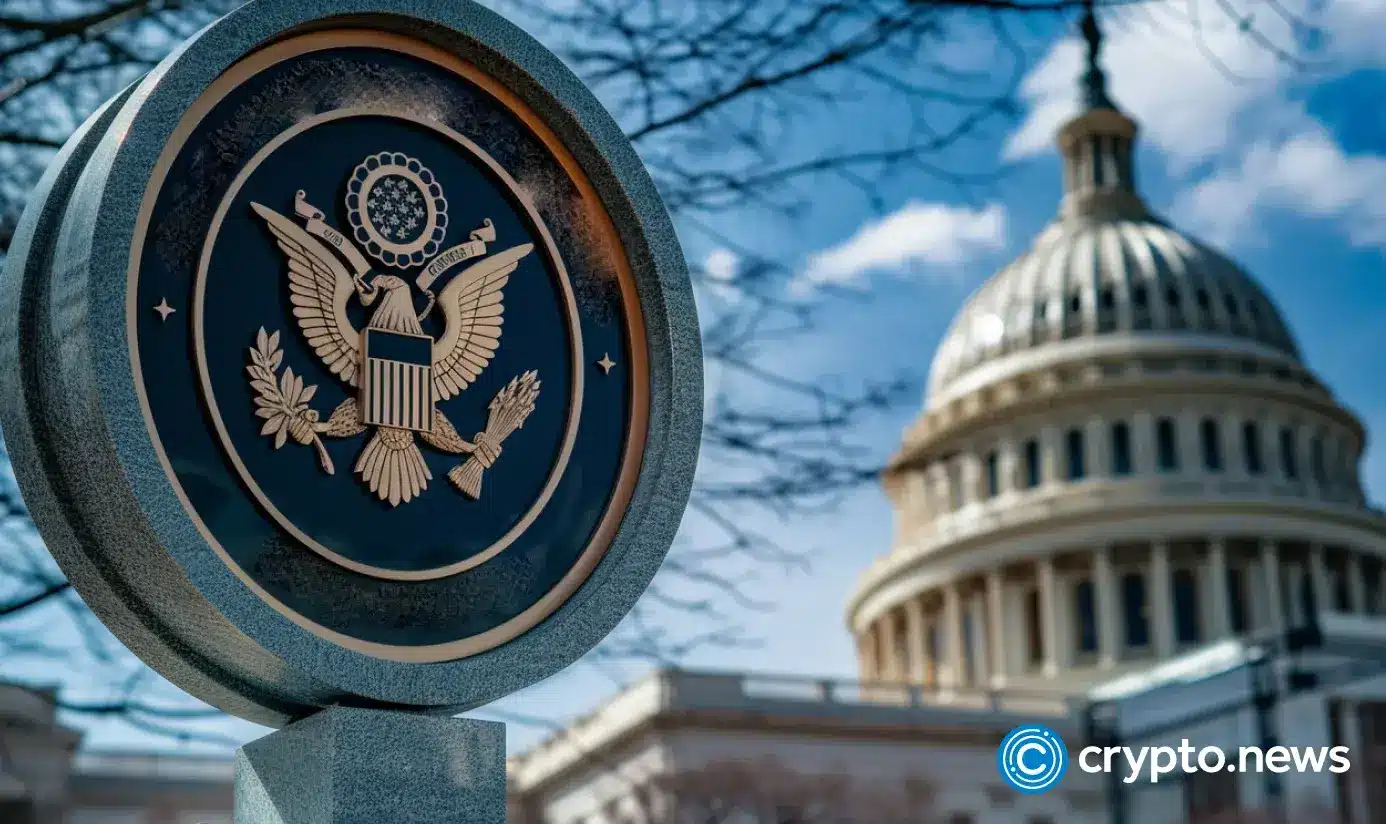Donald Trump
Gensler to resign as SEC chair: What’s next under Trump?
Published
5 months agoon
By
admin

Gary Gensler, the high-profile and often polarizing chair of the U.S. Securities and Exchange Commission, announced his resignation, effective the day President-elect Donald Trump takes office.
Here’s the announcement on X:
On January 20, 2025 I will be stepping down as @SECGov Chair.
A thread
— Gary Gensler (@GaryGensler) November 21, 2024
Gensler’s decision is hardly unexpected for those attuned to Washington’s political rhythms. Leadership changes at federal agencies often coincide with the arrival of a new administration, especially when there’s an ideological shift.
Here’s a closer look at the situation.
Gensler’s crackdown on crypto
Although Gensler’s term was slated to run through 2026, his resignation aligns with these unwritten rules of political transitions.
Gensler’s tenure, which began in 2021 under President Joe Biden, has been anything but uneventful. Known for his bold and uncompromising regulatory stance, he led an unprecedented crackdown on the crypto industry—a sector he once described as “rife with fraud and hucksters.”
Under his leadership, the SEC initiated a record 46 enforcement actions against crypto-related entities in 2023 alone, a 53% increase from 2022.
Some of the crypto-related lawsuits filed seemed reasonable. For example, the SEC’s case against Terraform Labs involved allegations of a massive fraud scheme. In June, a federal jury ruled against Terraform and its co-founder Do Kwon. They were ordered to pay over $4.5 billion in penalties, the largest ever imposed in a crypto-related case.
While some applauded his efforts to bring order to the industry, Gensler’s critics often accuse him of regulatory overreach and stifling innovation, particularly when it comes to cases against Ripple (XRP) and Coinbase.
Trump, whose family launched a crypto startup this year, vocalized his disdain for Gensler on the campaign trail and pledged to replace him “on day one.”
Dan Gallagher, Robinhood Markets’ chief legal officer, was considered a possible replacement for Gensler, but he is no longer interested.
As the SEC prepares for this leadership change, the agency faces critical questions about its future direction. What does Gensler’s departure mean for financial regulation in the U.S.? Who will take the reins, and how will their approach shape the nation’s financial landscape?
When Gensler confirmed his resignation, social media — particularly crypto enthusiasts populating X — erupted with tweets that ranged from bitter resentment to cautious relief.
Many within the crypto community didn’t hold back, particularly supporters of Ripple. Known as the “XRP Army,” they had long blamed Gensler for the SEC’s aggressive lawsuit against Ripple Labs, which tanked the value of XRP and dragged the community into a years-long legal battle.
“Congratulations to the XRP Army—this is the moment we’ve been waiting for,” one XRP supporter tweeted.
Congratulations to the XRP army on the one wish that we wanted for the past four years!
Yes, I am part of the XRP army.
— Tom Homan – Border Czar (Commentary account only) (@TomHoman_) November 21, 2024
Criticism extended beyond XRP, with retail investors calling Gensler’s tenure “the most destructive period in SEC history.” They cite his initial resistance to approving a Bitcoin (BTC) ETF and his handling of smaller investor disputes, such as the MMTLP stockholder case.
Adding to the backlash, the same post referenced a federal judge’s reported reprimand of the SEC in another enforcement case, framing it as a reflection of Gensler’s heavy-handed and controversial approach.
“Thank you for protecting no one from actual scams. You set America back years in crypto,” another social media user quipped.
Thank you for protecting no one from actual scams. You were a complete failure and you set america back years in crypto.
— Chainlink Red Pill (@ChainlinkP) November 21, 2024
High-profile industry figures also joined the chorus of criticism. Justin Sun, the founder of Tron (TRX), took a harsher tone, calling Gensler’s resignation “too late” and lamenting the “massive damage” he allegedly inflicted on U.S. markets and the global economy.
Finally, the end of an era—though, Gary, it’s a little too late. The damage is done, and it’s massive, scarring U.S. markets, the global economy, and everyday people. Let’s hope the next chapter brings accountability. If you need a job, contact me!
— H.E. Justin Sun
(@justinsuntron) November 22, 2024
In the end, Gensler’s exit isn’t just the close of a contentious chapter; it’s the start of a critical transition for the SEC and the industries it oversees.
Who will lead the SEC next?
With Gensler’s resignation, the focus is shifting to who will succeed him—a decision that could reshape the future of crypto regulation in the U.S.
Journalist Eleanor Terrett of Fox Business has suggested that the next SEC chair may bring a fresh outlook on crypto.
I’ve been told by sources close to the transition team that the new @SECGov chair will be pro-crypto, the nominee will also have to be well-equipped to handle all the other issues under the SEC’s purview — public companies, the stock market, the bond market, private funds, the… https://t.co/iIRrhwvSxx
— Eleanor Terrett (@EleanorTerrett) November 15, 2024
According to her sources, the incoming administration is prioritizing a candidate who is “pro-crypto” yet equipped to handle the SEC’s broader responsibilities, including oversight of public companies, stock and bond markets, and private funds.
Among the leading contenders is Paul Atkins, a former SEC commissioner known for his free-market philosophy and favorable stance on crypto.
Charles Gasparino of Fox Business reported that Atkins is currently viewed as a frontrunner, buoyed by strong support from both the business and crypto communities.
SCOOP: Former SEC commission Paul Atkins is said to be in the lead position to replace @GaryGensler as @SECGov chair, according to a person with direct knowledge of the matter. As with all things in Trump World this could change, of course. Fox Business has previously reported…
— Charles Gasparino (@CGasparino) November 21, 2024
Atkins’ approach stands in stark contrast to Gensler’s enforcement-heavy style. While critics argue that Atkins may be too lenient, his supporters believe his leadership would promote innovation by lowering regulatory barriers.
Another prominent name in the running is Robert Stebbins, a partner at Willkie Farr & Gallagher and former SEC General Counsel under Jay Clayton.
Scoop: A name that’s gaining steam in the race for @SECGov Chair is Robert Stebbins, a partner at Wilkie Farr & Gallagher, and former SEC General Counsel under Jay Clayton, nominee for US Atty Southern District. Keep an eye on this name.
— Charles Gasparino (@CGasparino) November 15, 2024
Stebbins is widely regarded as a steady and pragmatic candidate, offering deep legal and regulatory expertise. While his pro-crypto stance is less favorable than Atkins’, his previous experience at the SEC gives him credibility with both policymakers and financial institutions.
Teresa Goody Guillén is also emerging as a potential candidate. A veteran of the SEC and a partner at BakerHostetler, where she co-leads the blockchain practice.
BREAKING NEWS: @realDonaldTrump is considering blockchain lawyer Teresa Goody Guillén to replace Gary Gensler as head of the SEC.
Teresa has represented many blockchain companies against the SEC in her time as co-lead of BakerHostetler’s blockchain group.
She spent time in… pic.twitter.com/bg8fj8XZMS
— Dylan K (@MightyDylanK) November 20, 2024
Crypto companies are reportedly advocating for her nomination, confident that her dual experience as an SEC insider and blockchain advocate would bring a balanced perspective to the role.
Brian Brooks, the former Acting Comptroller of the Currency, is another notable name being floated for key financial regulatory positions, including the SEC chair.
NEW: FOX Business has learned that former OCC Acting Director under Trump @BrianBrooksUS is on the lists for “various financial agency roles besides the CFTC”, according to a source close to him.
Outside the CFTC, some of the other financial regulatory agencies are the…
— Eleanor Terrett (@EleanorTerrett) November 18, 2024
Dubbed the “Crypto Comptroller” for his blockchain-friendly policies during his tenure at the OCC, Brooks has been a vocal proponent of integrating crypto into mainstream banking.
While Terrett noted that Brooks is under consideration for multiple roles beyond the SEC, his appointment here could signal a transformative period for crypto regulation.
Interestingly, the shakeup may not be limited to the SEC. Terrett suggests that the Trump administration is exploring an expanded role for the Commodity Futures Trading Commission in crypto oversight.
Such a move could involve splitting regulatory responsibilities between the SEC and CFTC—or even transferring primary authority to the CFTC entirely.
However, as Terrett pointed out, this shift would require a colossal increase in funding for the CFTC, which currently lacks the resources to manage such an expansive mandate. For now, speculation continues.
Preparing for the change
Gensler’s resignation has left crypto industry insiders speculating about what lies ahead, with many experts pointing to a mix of challenges and opportunities.
Slava Demchuk, CEO of AMLBot, in a conversation with crypto.news talked about one of the most pressing issues: the lack of clear rules for crypto in the U.S., especially compared to the EU’s Markets in Crypto-Assets Regulation.
“Without clear regulations, crypto companies have been left in limbo, unable to fully understand compliance requirements or attract major institutional players.”
One particularly thorny problem is crypto companies’ struggles to access banking services. Niko Demchuk, Head of Legal at AMLBot, described how banks in the U.S. are often hesitant to work with crypto firms due to the risk of regulatory fallout.
“Banks don’t want to associate with companies that might be out of compliance. Even indirect ties to crypto can bring scrutiny or fines, creating bottlenecks for the industry, making it difficult for businesses to perform everyday financial operations.”
If the next chair adopts a more crypto-friendly stance, there’s potential for key improvements, including clearer regulations, better access to banking, and a more welcoming environment for innovation.
The prospect of a regulatory framework similar to the EU’s MiCA is also gaining traction. Experts believe that such a framework could bring greater consistency to the U.S. market, addressing issues like cybersecurity, anti-money laundering, and market manipulation.
For crypto companies, this transitional period is an opportunity to get ahead and focus on strengthening compliance systems, enhancing know-your-customer processes, and investing in tools like transaction monitoring.
“Businesses need to be proactive. Regulatory changes are coming, and those who are prepared will have a smoother adjustment,” Demchuk added.
For crypto firms, the time to act is now—because what comes next could reshape the future of the crypto industry in the U.S. and across the globe.
Source link
You may like


AVAX Falls 2.1% as Nearly All Assets Trade Lower


What is a VTuber, and how do you become one in 2025?


Top Expert’s Update Sets $10 Target


How Academia Interacts With The Bitcoin Ecosystem


AB DAO and Bitget Launch Dual Reward Campaign, Distributing $2.6M Worth of $AB Globally


AI crypto tokens at risk as Nvidia faces restrictions on China exports
Donald Trump
President Trump Executive Director Says U.S. Could Use Tariff Revenue To Build Strategic Bitcoin Reserve
Published
18 hours agoon
April 15, 2025By
admin
Bitcoin advocate and investor Anthony Pompliano sat down with Bo Hines, Executive Director of President Donald Trump’s Council of Advisers for Digital Assets, in a headline-making White House interview that offered the most detailed look yet at the administration’s ambitious plans for a U.S. strategic Bitcoin reserve.
I went to the White House to interview @BoHines about the administration’s crypto plans.
We talked about the US strategic bitcoin reserve, stablecoins, regulation, how decisions are being made, gold, tariffs, law enforcement, motivational aspect inside Trump admin, biggest… pic.twitter.com/SpApPOBPok
— Anthony Pompliano
(@APompliano) April 14, 2025
The conversation touched on a wide range of policy priorities — from stablecoin regulation and interagency cooperation to tariffs, law enforcement, and legislative developments — but a focal point of the conversation was the administration’s intent to aggressively accumulate Bitcoin without increasing the burden on taxpayers. “We have obviously made it very clear that we want to acquire as much as we can get,” Hines told Pompliano. “I’ve said that repeatedly throughout my time on the speaking circuit over the course of the last few months… it stipulates that we have to acquire bitcoin in budget neutral ways that don’t cost the taxpayer a dime.” One of the most eye-catching proposals involves using revenue from tariffs to fund Bitcoin purchases, which was interesting given the recent global trade war around tariffs and a recent White House economic projection stating that “a global tariff of 10% would grow the economy by $728 billion.” “I think that we have, as the President likes to say, ‘many high IQ people’ working on these solutions,” Hines added. “We’ll come together and flesh out some of these ideas and really get to the best solution.” Hines also addressed Senator Cynthia Lummis’ proposed BITCOIN Act of 2025, which calls for the U.S. to acquire 200,000 BTC annually for five years, building a million-bitcoin reserve. “I think Senator Lummis has really an interesting idea with the BITCOIN Act,” said Hines. “Here what you would do is — you revalue the gold certificates that we currently have at Treasury… Most of which I think are valued around $43 an ounce… now we’re sitting at what, $3,100 an ounce… and if you took that value, what you could do is use that extra funding in order to buy more bitcoin.” As Hines emphasized, “There’s literally countless ways in which we can do this… everything’s on the table, and like we’ve said, we want as much as we can get.” Following the interview, Pompliano published a video to his X account sharing his top ten key takeaways from his interview with Hines, which can be found below, and the full interview can be found here on Pompliano’s YouTube channel here. Published on By Crypto’s moment has seemingly arrived in Washington, D.C., and the industry is trying to make the most of it. But as new organizations hatch and leadership shifts at the top advocacy operations, the field of pro-crypto groups trying to carry the torch is more crowded than ever. No fewer than a dozen groups — including the Digital Chamber, Blockchain Association and Crypto Council for Innovation — are seeking to steer digital assets policies in the U.S., some of them substantially overlapping in their membership bases, funding sources and in the goals they’re seeking to accomplish. Most of the leaders of those groups told CoinDesk they have a more-the-merrier view on pushing for friendly policy from President Donald Trump’s highly receptive administration and from Congress, which is increasingly loaded with industry allies. “Many of the objectives are consistent across these groups,” said Miller Whitehouse-Levine, who recently left the DeFi Education Fund to launch the new Solana Policy Institute. “That’s a good thing, because I think there’s an absolute torrent of legislative and regulatory work that’s going on right now, and we need all the help we could get.” Congress is chasing several crypto bills, including legislation to set boundaries for crypto markets, oversee stablecoin issuers, curtail digital assets in illicit financing, call for proof of reserves at crypto firms and set up government digital reserves. “We would have 100 more groups and 10,000 more people working on these issues in an ideal world,” Whitehouse-Levine added. But other current and former policy advocates privately grant that the field is getting packed and that it can be difficult to justify so many entities pulling for the same cause with the same finite universe of congressional staff, White House offices and regulatory officials. In the recent past, groups have talked about reorganization and consolidation, according to people familiar with the discussions, though such efforts haven’t been executed. Meanwhile, new organizations have hung their shingles in recent weeks, including Whitehouse-Levine’s SPI and the National Cryptocurrency Association, further increasing the ranks. That’s often how the numbers have grown in Washington: A company or lobbyist who feels some specific interest isn’t properly represented and can figure out how to pay for it. And big crypto firms have also set up their own D.C. operations, pushing for their more highly tailored interests. Cody Carbone is still just days into his leadership of the Digital Chamber — the oldest and largest crypto membership group. The Chamber and virtually every other major digital assets organization has lost or swapped leaders in the opening months of this year — many of them in the past few weeks. He said he understands why so many are suddenly keen on showing up in Washington to take advantage of the turn in crypto sentiment, and he sees this crowded field of U.S. groups as a net positive when there is so much work to go around getting complex legislation done. “At some point, there could be too many cooks in the kitchen,” he said. “But I think that’s a problem for a later day.” Sheila Warren, who recently stepped away as the chief of CCI, said “there’s definitely room for differentiation” in crypto’s growing army of boosters, but she said a united front — in whatever form — is key. “I think it’s really about coming together and recognizing that we all pretty much want the same things,” she said. Not all of the groups share the same agendas. Some focus on narrow areas of the industry, and a few are more oriented toward research or serving crypto users rather than companies. Their ranks include Coin Center, Satoshi Action Fund, Bitcoin Policy Institute, Government Blockchain Association and Bitcoin Mining Council. Ripple started the new NCA with an astounding $50 million commitment, and it’s meant to be one of those more interested in the people who use and invest in crypto than the industry players. On the raw, political edge of advocacy, the industry — especially U.S. exchange Coinbase — has entered the arena. Coinbase set up Stand With Crypto in an effort to jump-start a grass-roots-style crypto movement. That message-of-the-people strategy was bolstered by the extremely well-funded political action committee Fairshake and the dark-money influence arm, Cedar Innovation Foundation. Fairshake spent more than a hundred million dollars to put friendly lawmakers into congressional seats last year, and the industry is already seeing big, bipartisan support in the early days of the new session. One point of evidence: The Democrats came out in force to join Republicans in killing an Internal Revenue Service rule that could have made existence-threatening demands on decentralized finance (DeFi) projects. “I think it’s a huge benefit that we have so many organizations dedicated to trying to achieve regulatory clarity for digital assets,” said Amanda Tuminelli, who stepped up to run the DeFi Education Fund when Whitehouse-Levine left. “I think it’s been really needed, especially in the past few years, and when we work together, we actually accomplish great outcomes. For example, the IRS broker rule on DeFi.” As it tackles those major questions on tax, government crypto reserves, the structure of the markets and regulations of stablecoins, the crypto lobbying space is leaping into a new chapter. That transition is made even more stark with the sudden and dramatic shuffle of leadership. Kristin Smith, who was the chief of one of the leading groups, left the Blockchain Association to go work for former underling Whitehouse-Levine as president of his new Solana organization. So the association is left shopping for a new CEO. Meanwhile, the founder and longtime leader of the Digital Chamber, Perianne Boring, exited that job for unpaid work leading the board, and the founder of crypto think tank Coin Center similarly departed. In Warren’s absence at CCI, Ji Kim — the group’s former general counsel and head of global policy — told CoinDesk he remains “laser-focused on ensuring that CCI continues to be the leading, substantive and global voice for our members on key policy issues.” When asked about the potential of organization mergers, he said he had “nothing to say” on that point. The lobbyists and advocates have routinely come together on letters, events and papers pushing their common aims. Carbone said there’s “definitely friendliness and conversations between us,” though he said there “needs to be more collaboration.” However, the groups have practical needs for funding and members, and they’re driven to secure members who can sometimes only afford to join one or two of them. “There’s obviously a competitiveness angle to this as well,” Carbone acknowledged. “It would be naive to say there’s not, so there’s a race sometimes.” Published on By Binance, the world’s largest cryptocurrency exchange, is plotting a return to the U.S. based on newfound ties with the Trump family. According to the Wall Street Journal, executives from Binance met with U.S. Treasury officials last month to request the removal or reduction of a federal monitorship that has overseen the exchange’s compliance with anti-money-laundering laws since it pled guilty in 2023 and paid a record $4.3 billion fine. Canada also fined Binance, but the penalty was much lower at $4.3 million. At the same time, Binance has been exploring a business deal with World Liberty Financial (WLFI), a DeFi venture that claims to be “inspired” by President Donald Trump and has plans to launch a dollar-pegged stablecoin called USD1. Listing the token on Binance could generate billions for the Trumps, who are currently losing millions on the WLFI venture. Trump and his family control more than 60% of the WLFI project. The WSJ reports that Binance’s budding alliance with the Trump family stems from a private gathering in Abu Dhabi last December. Binance founder Changpeng Zhao met with Eric Trump and Steve Witkoff, who helped co-found World Liberty. Fast-forward to now: The quid pro quo for the Trump administration offers a chance to roll back strict oversight; for the Trumps, Binance’s massive global reach — 250 million users and $65 billion in daily volume— could bolster the family’s crypto ambitions. Crypto.news reached out to WLFI, but a spokesperson did not respond immediately with a comment. The Trump administration has already made favorable moves toward the exchange, including disbanding a Department of Justice crypto enforcement unit. Internally, Binance also seeks a presidential pardon for Zhao, who served four months in prison for violating U.S. anti-money laundering and sanctions regulations. A Binance spokesperson did not respond to a request for comment. Meanwhile, Trump representatives have reportedly discussed buying a stake in Binance.US, the exchange’s struggling American arm, and using Zhao’s connections to deepen the partnership. The situation spotlights the unusual overlap between past enforcement targets and a White House now open to alliances with crypto bigwigs. With Trump — himself a convicted felon — already pardoning figures like BitMEX co-founder Arthur Hayes, the new crypto era in Washington, D.C., seems poised to reward the very “bad actors” the sector’s leaders complain about. Arthur Hayes, Murad’s Prediction For Meme Coins, AI & DeFi Coins For 2025 Expert Sees Bitcoin Dipping To $50K While Bullish Signs Persist Aptos Leverages Chainlink To Enhance Scalability and Data Access Bitcoin Could Rally to $80,000 on the Eve of US Elections Crypto’s Big Trump Gamble Is Risky Sonic Now ‘Golden Standard’ of Layer-2s After Scaling Transactions to 16,000+ per Second, Says Andre Cronje Institutional Investors Go All In on Crypto as 57% Plan to Boost Allocations as Bull Run Heats Up, Sygnum Survey Reveals Ripple-SEC Case Ends, But These 3 Rivals Could Jump 500x
Source link Blockchain Association
U.S. Crypto Lobbyists Flooding the Zone, But Are There Too Many?


New leaders
Politics
Source link Changpeng Zhao
Binance preps US comeback, courts Trump for help: report


Source link 
AVAX Falls 2.1% as Nearly All Assets Trade Lower

What is a VTuber, and how do you become one in 2025?

Top Expert’s Update Sets $10 Target

How Academia Interacts With The Bitcoin Ecosystem

AB DAO and Bitget Launch Dual Reward Campaign, Distributing $2.6M Worth of $AB Globally

AI crypto tokens at risk as Nvidia faces restrictions on China exports

Coinbase Urges Australia to Vote for Crypto Progress in May

How High Would Pi Network Price Go If Pi Coin Adopts Transparency to Avoid Mantra Pitfalls

XRP’s ‘Rising Wedge’ Breakdown Puts Focus on $1.6 Price Support

China selling seized crypto to top up coffers as economy slows: Report

Ethereum Price Dips Again—Time to Panic or Opportunity to Buy?

The Inverse Of Clown World”

Bitcoin Indicator Flashing Bullish for First Time in 18 Weeks, Says Analyst Who Called May 2021 Crypto Collapse

3iQ and Figment to launch North America’s first Solana staking ETF

Bitcoin Miners Are Selling More BTC to Make Ends Meet: CryptoQuant

Arthur Hayes, Murad’s Prediction For Meme Coins, AI & DeFi Coins For 2025

Expert Sees Bitcoin Dipping To $50K While Bullish Signs Persist

Aptos Leverages Chainlink To Enhance Scalability and Data Access

Bitcoin Could Rally to $80,000 on the Eve of US Elections

Crypto’s Big Trump Gamble Is Risky

Sonic Now ‘Golden Standard’ of Layer-2s After Scaling Transactions to 16,000+ per Second, Says Andre Cronje

Institutional Investors Go All In on Crypto as 57% Plan to Boost Allocations as Bull Run Heats Up, Sygnum Survey Reveals

Ripple-SEC Case Ends, But These 3 Rivals Could Jump 500x

3 Voting Polls Show Why Ripple’s XRP Price Could Hit $10 Soon

Has The Bitcoin Price Already Peaked?

A16z-backed Espresso announces mainnet launch of core product

The Future of Bitcoin: Scaling, Institutional Adoption, and Strategic Reserves with Rich Rines

Xmas Altcoin Rally Insights by BNM Agent I

Blockchain groups challenge new broker reporting rule

I’m Grateful for Trump’s Embrace of Bitcoin
Trending




















